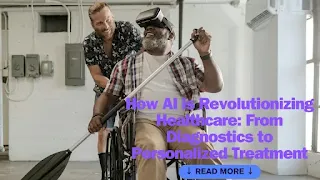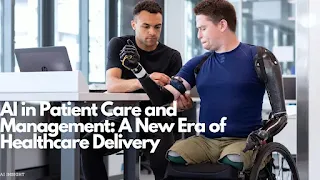How AI is Revolutionizing Healthcare
How AI is Revolutionizing Healthcare: From Diagnostics to Personalized Treatment
Introduction
In recent years, artificial intelligence (AI) has emerged as a powerful tool with the potential to revolutionize healthcare.
From improving diagnostic accuracy to enabling personalized treatment plans, AI is transforming how we approach medicine.
While AI in healthcare is still evolving, its impact is already being felt across various fields, from radiology and surgery to patient care and drug discovery.
In this blog post, we will explore how AI is reshaping healthcare, focusing on its applications in diagnostics, personalized medicine, and patient management.
 |
| AI-Powered Virtual Health Assistants |
1. AI in Diagnostics: Accuracy and Speed Combined
One of the most significant contributions of AI to healthcare lies in its ability to improve diagnostics.
Traditional diagnostic methods, while effective, often rely heavily on human interpretation, leaving room for errors or oversight.
AI, on the other hand, can process vast amounts of data with unmatched speed and accuracy.
Medical Imaging and AI: A Perfect Match
AI algorithms, particularly machine learning (ML) and deep learning have become essential in the field of medical imaging.
They can analyze medical images such as X-rays, MRIs, and CT scans, helping doctors identify diseases that may be hard to spot with the naked eye.
For instance, AI has shown exceptional promise in detecting conditions like lung cancer, breast cancer, and stroke with high accuracy.
In fact, some AI systems have demonstrated diagnostic capabilities that rival or even surpass those of human radiologists.
By analyzing images pixel by pixel, AI can identify patterns that might be missed during manual reviews.
This has the potential to significantly reduce diagnostic errors and, in some cases, catch diseases in their earliest stages, when they are most treatable.
Early Detection of Diseases
AI is also proving invaluable in the early detection of diseases, particularly in areas where timely diagnosis is critical.
For example, AI tools are being developed to screen for Alzheimer's disease long before symptoms appear. By analyzing patterns in brain scans or even subtle changes in speech, AI can detect signs of the disease years ahead of conventional methods.
Early diagnosis not only improves patient outcomes but also reduces healthcare costs by enabling early intervention.
2. Personalized Treatment Plans: AI Tailoring Care to the Individual
Personalized medicine has long been a goal in healthcare, and AI is bringing us closer to that reality.
Rather than taking a "one-size-fits-all" approach to treatment, AI allows doctors to create treatment plans tailored to each patient's unique needs, genetic makeup, and lifestyle.
Genomics and AI: Unlocking the Secrets of DNA
AI is playing a critical role in the field of genomics, where it is helping researchers understand the complex relationships between genetics and diseases.
By analyzing a patient’s genetic data, AI can predict how they might respond to certain treatments or medications.
For example, AI can help determine whether a patient is likely to benefit from a particular cancer therapy or if they are at risk of adverse side effects.
This approach, often referred to as precision medicine, is already being used in cancer treatment.
AI algorithms analyze genetic mutations in a tumor and recommend targeted therapies that are most likely to be effective.
This not only improves treatment outcomes but also minimizes unnecessary side effects by avoiding treatments that are unlikely to work for the individual patient.
AI and Drug Development
Drug discovery is another area where AI is making strides.
The traditional process of developing new drugs is time-consuming and costly, often taking years and billions of dollars to bring a new treatment to market.
AI is streamlining this process by analyzing large datasets of chemical compounds, genetic information, and clinical trial data to identify potential drug candidates faster than ever before.
For example, AI-powered platforms are being used to identify promising molecules that can target specific diseases.
These platforms can sift through millions of potential compounds in a fraction of the time it would take using traditional methods. AI also helps predict how different molecules will interact with the body, reducing the risk of failure during clinical trials.
3. AI in Patient Care and Management: A New Era of Healthcare Delivery
Beyond diagnostics and treatment, AI is also improving patient care and management, offering new ways to monitor health, streamline hospital operations, and enhance the overall patient experience.
AI-Powered Virtual Health Assistants
AI-powered virtual health assistants are becoming increasingly common in patient care.
These assistants, often integrated into mobile apps or chatbots, provide patients with real-time medical advice, appointment reminders, and even help with medication management. AI virtual assistants can answer questions about symptoms, offer guidance on when to seek medical attention, and even provide mental health support.
For example, apps like Ada and Babylon Health use AI to analyze patient-reported symptoms and offer potential diagnoses or advice on the next steps.
These tools are particularly useful for patients in remote areas or those who may not have immediate access to a healthcare provider.
Remote Patient Monitoring
AI is also making remote patient monitoring more efficient and accessible.
Wearable devices, such as smartwatches and fitness trackers, can collect real-time data on a patient's vital signs, such as heart rate, blood pressure, and oxygen levels.
AI algorithms then analyze this data to detect any abnormalities or patterns that may indicate a potential health issue.
For patients with chronic conditions like diabetes or heart disease, AI-powered remote monitoring systems can alert healthcare providers to early signs of complications, enabling timely interventions.
This not only improves patient outcomes but also reduces hospital readmissions and healthcare costs.
AI in Hospital Management
AI is not only revolutionizing direct patient care but also the way hospitals and healthcare facilities operate.
AI systems are being used to optimize hospital workflows, manage patient schedules, and even predict staffing needs based on patient influx.
For instance, AI can analyze data from electronic health records (EHRs) to predict which patients are at higher risk of complications after surgery, allowing hospitals to allocate resources more effectively.
Additionally, AI-driven platforms help manage bed availability, ensuring that hospitals are prepared for surges in patient demand, such as during the flu season or a pandemic.
 |
| AI in Patient Care and Management |
4. Ethical Considerations and Challenges
While the potential of AI in healthcare is immense, it also raises important ethical questions and challenges that must be addressed.
Data Privacy and Security
AI systems rely on vast amounts of personal health data, raising concerns about data privacy and security.
Ensuring that patient data is protected from breaches and misuse is crucial, particularly as more healthcare providers adopt AI-powered tools.
Governments and healthcare organizations must implement strict regulations to safeguard patient information while allowing AI to thrive.
Bias in AI Algorithms
Another challenge is ensuring that AI algorithms are free from bias.
If AI systems are trained on biased data, they may produce inaccurate or unfair outcomes, particularly for minority or underserved populations.
Ensuring diversity in the data used to train AI models is essential for achieving equitable healthcare outcomes.
The Human Touch
While AI can automate many tasks, it’s important to remember that healthcare is, at its core, a human-centered field.
AI should be seen as a tool that enhances the capabilities of healthcare professionals, rather than replacing them.
Maintaining the human touch in patient care is essential, particularly in sensitive areas such as mental health and end-of-life care.
Conclusion
Artificial intelligence is undoubtedly revolutionizing healthcare, offering unprecedented advancements in diagnostics, personalized treatment, and patient care. From improving the accuracy of medical imaging to tailoring treatment plans based on a patient’s genetic makeup, AI is transforming the way we approach health and wellness.
As AI continues to evolve, its potential to improve healthcare outcomes will only grow. However, it is essential to balance technological innovation with ethical considerations, ensuring that AI benefits all patients equally and enhances the human elements of healthcare.
The future of healthcare is undoubtedly AI-driven, and as we navigate this exciting frontier, the possibilities for improved patient care and medical breakthroughs are endless.
